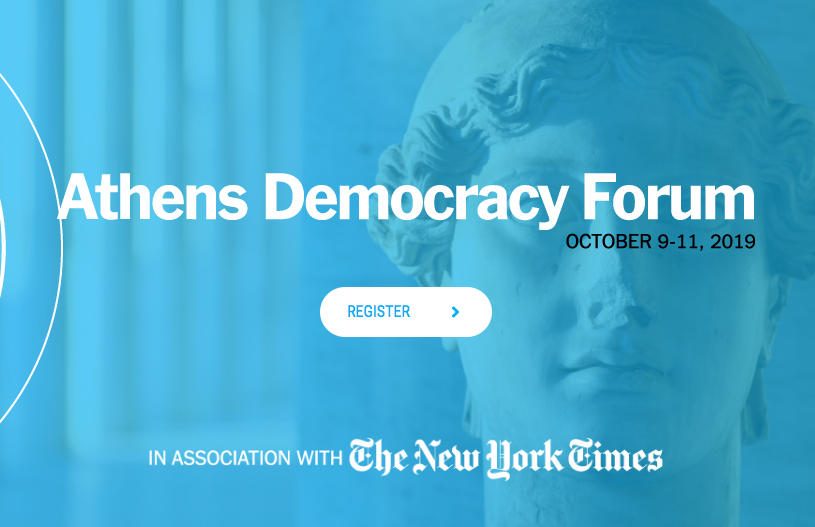On September 16, 2019, the United Macedonian Diaspora (UMD) and the Macedonian Canadian Lawyers’ Association (MCLA) sent an open letter to The New York Times in relation to next month’s Athens Democracy Forum addressing Greece’s general mistreatment of minorities and the country’s suppression of basic human rights and religious freedoms.
In the spirit of promoting democracy and stimulating a frank discussion about the state of democracy in the Forum’s host country of Greece, it is UMD and MCLA’s hope that The New York Times will consider some of the suggestions made in the letter.
“The government in Athens faces a plethora of evidence for undemocratic practices in its treatment of minorities, its openly discriminatory legal framework, lack of religious freedom and oppressive foreign policy…It is our hope that in the spirit of improving the state of democracy, the Athens Democracy Forum and The New York Times will reflect on the treatment of minorities in Greece and will bring minority issues to the fore of this year’s event,” noted UMD President Metodija A. Koloski and MCLA President Chris G. Paliare, O.Ont., LSM.
Full text of the letter below:
September 16, 2019
The New York Times
242 W 41st St
New York, NY 10036
Re: Athens Democracy Forum
To the Editor:
The promotion of democracy is a worthy undertaking, especially during periods of democratic recession. The New York Times’ collaboration on the Athens Democracy Forum should be applauded as a positive step in this direction. The Athens Democracy Forum cites the urgent need to assess the state of democracy, and though we agree, we believe that a fraction of self-assessment on the part of the Greek hosts of this event is warranted. Although the country has stubbornly stuck to its preferred designation as the cradle of democracy, a closer look into the treatment of minorities in Greece reveals deep-seated problems and disturbing issues with realization of basic human rights.
The right to ethnic self-determination is a key tenet of democratic governance. Greece’s blatant refusal to extend this right to ethnic Macedonians directly conflicts with democratic principles supposedly espoused by the Greek government. For decades Greece has disallowed Macedonians from identifying as a minority group, despite their sizable presence in northern Greece. While numerous reports detail the discriminatory nature of the Greek approach to minority rights and the extent to which it threatens democratic norms, Greek authorities often downplay these reports. In light of the Athens Democracy Forum, the United Macedonian Diaspora (UMD) and the Macedonian Canadian Lawyers’ Association (MCLA) believe it is necessary to bring to your attention some of the human rights violations that raise doubts about Greece’s designation as a cradle of democracy.
One of the most comprehensive attempts to uncover Greece’s treatment of its Macedonian ethnic minority was conducted by Human Rights Watch in the mid-1990s. The report notes various violations of basic human rights, including the refusal of Greek authorities to allow ethnic Macedonians the right to self-identification. For example, the Greek government has refused the extension of self-identification for ethnic Macedonians in Greece, and instead state officials have imposed insulting and inaccurate descriptions, such as Slavophone Greeks or bilinguals. As a result, official census data has been skewed, thanks to the forcible identification of ethnic Macedonians as Slav speakers starting as early as 1951. According to the report, these and other discriminatory policies have resulted in a striking climate of fear among ethnic Macedonians in Greece, who tremble before the possibility of losing their jobs and being harassed by the police merely as a result of publicly asserting their ethnic affiliation.
Subsequent reports have only corroborated the findings by the Human Rights Watch report. A 2008 report, by the Council of Europe Commissioner for Human Rights, details the systematic discriminatory measures by Greek authorities, including the refusal to allow any minority other than a religious minority, the Muslims, the right to self-determination. Deepening their dismay at Greek policies, the Commissioner’s office noted that the Greek government has instituted policies that negate the right to freedom of assembly and freedom of expression. For example, Greek authorities have persistently barred private groups and associations from using the words Turk or Macedonian in their official associations’ names. In a report that same year, the United Nations (UN) Human Rights Council urged Greece to “comply fully with the judgements of the European Court of Human Rights, specifically those decisions that associations should be allowed to use the words “Macedonian” and “Turkish” in their names and to express their ethnic identities freely.” Gay McDougall, the author of the damning UN report, also reflected on the continual efforts by Greek officials and policymakers to vehemently suppress the right of ethnic Macedonians to express their cultural identity freely, including the right to speak their native tongue.
In the past, Greece has been found guilty by the European Court of Human Rights of violating basic human rights, including the right to free association. What is particularly striking about Greece’s unequal application of free association rights is the country’s targeted suppression of such rights to ethnic minorities. Two prominent legal cases, Sidiropoulos and Others vs. Greece, and Ouranio Toxo and Others v. Greece perfectly illustrate Greece’s systemic approach to quash basic human rights. Coupled with general societal hostility toward distinct ethnic groups such as Macedonians and Turks, these undemocratic state policies generate prejudice, stereotyping and labor market discrimination unbecoming of democratically governed countries especially those that are members of the founding nations of the EU, members of NATO and signatories of the Helsinki Accords. Of course, one of the fundamental tenets of the Helsinki Accords was the following:
“The participating States on whose territory national minorities exist will respect the right of persons belonging to such minorities to equality before the law, will afford them the full opportunity for the actual enjoyment of human rights and fundamental freedoms and will, in this manner, protect their legitimate interests in this sphere.”
Religious freedom is yet another cornerstone of democracies, and an absolutely protected right under the Helsinki Accords. Faced with declining freedom of religion globally, democratic countries must take charge in extending religious freedoms to its citizens. Yet, the Greek experience with religious freedom is a sad manifestation of governmental suppression of the right to worship. Under Greek law, there is no effective separation of church and state, and the government functions almost inseparably from the Greek Orthodox Church. In relation to Macedonian Orthodox worshipers, successive Greek governments have taken abusive actions that discriminate against ethnic Macedonian members of the Macedonian Orthodox Church in Greece. The abuses of ethnic Macedonians in Greece right to freedom of religion in Greece range from disallowing the existence of a Macedonian Orthodox Church to excommunicating priests and church members affiliated with the ethnic Macedonian community. A 2013 report, by the United Macedonian Diaspora, details religious rights abuses committed over Greece’s Macedonian minority. To be sure, the Greek religious intolerance extends well beyond the Macedonian ethnic community. For example, year after year Catholic worshipers attempt to secure official recognition of the Catholic Church’s canon laws by Greek authorities, but all of their efforts have been in vain. The State Department’s own Office of International Religious Freedom report from 2018 notes the difficulties and discrimination to which Greek Muslims are exposed. The Greek state endeavor of securing an exclusively monopolistic position for the Greek Orthodox Church at the expense of all other religions is a ruthless campaign that spares no religious group.
Numerous undemocratic practices have also been noted in the area of interethnic life in Greece as well. The UN has expressed concern over the endemic problems facing Greece’s Roma community, which is subject to “police brutality, discriminatory and racist attitudes and treatment by prosecutors” and excessive delays in accessing legal and human rights. Roma children are often denied the right to attend local schools, and many Roma people have difficulties obtaining basic identification documents. In addition to mistreating its own ethnic minorities, two successive Greek governments have faced a sea of criticism for their “cruel, inhumane and cynical” treatment of asylum seekers.
Greece’s disregard of democratic norms and principles is also evident in the country’s approach to foreign policy. Greece, a much stronger country and a prominent member of the European Union and NATO, has bullied Macedonia and blocked its Euro-Atlantic aspirations for decades. Under the false pretense of a threat posed by the mere existence of a Macedonian ethnic identity, Greece has imposed economic embargoes, sanctions and political vetoes on Macedonia – actions that have nearly collapsed the fragile landlocked country of Macedonia. The latest manifestation of Greece’s oppressive foreign policy is the signing of the Prespa Agreement, a seemingly pro-democratic agreement that conceals a number of undemocratic provisions. For starters, the agreement was ratified through questionable political procedures, following a failed referendum in Macedonia and allegations of bribery and back-room judicial bargaining.
In addition, the Prespa Agreement is the first document of its kind to effectively discontinue an entire ethnic group’s cultural and historic affiliations, and replace them with a newly imposed, Greek-mandated concept of identity that does not reflect the ethnic character of Macedonians. The agreement also contains provisions that allow Greek officials to control the information contained in textbooks and maps intended for Macedonian school children inside the Republic of Macedonia. Ultimately, the Prespa agreement is the culmination of a long, undemocratic, and pointed effort to bully a powerless neighboring state into total and complete submission.
The government in Athens faces a plethora of evidence for undemocratic practices in its treatment of minorities, its openly discriminatory legal framework, lack of religious freedom and oppressive foreign policy. Ethnic and religious minorities in Greece have faced and continue to face numerous violations of their basic human rights, including violations of rights to self-determination and freedom of assembly. It is our hope that in the spirit of improving the state of democracy, the Athens Democracy Forum and The New York Times will reflect on the treatment of minorities in Greece and will bring minority issues to the fore of this year’s event.
We would be happy to suggest a list of intellectuals and speakers qualified to speak on these topics. In fact, we believe that extending an invitation to a broader range of speakers would aid to the Athens Democracy Forum’s mission to evaluate the state of democracy generally, and the state of democratic governance in Greece in particular.
Lending the prestigious name of The New York Times to this conference dealing with democracy requires The New York Times to raise these anti-democratic, blatant violations of human rights in the host country.
Yours very truly,
Metodija A. Koloski
President
United Macedonian Diaspora
Chris G. Paliare, O.Ont., LSM
President
Macedonian Canadian Lawyers’ Association

